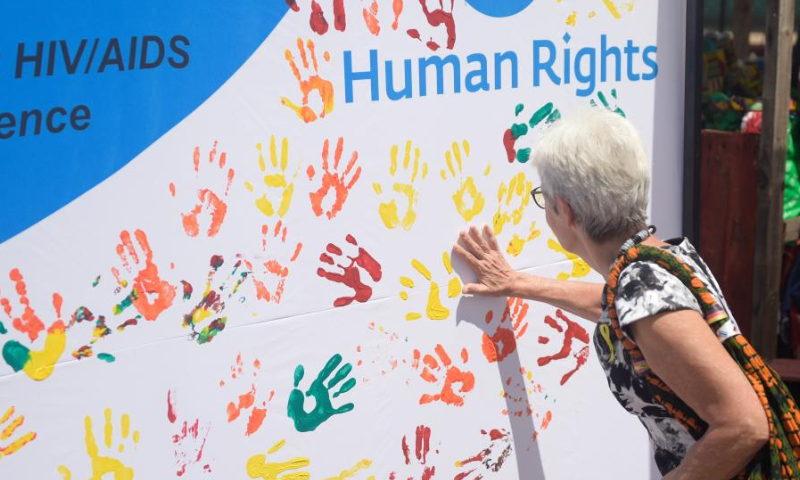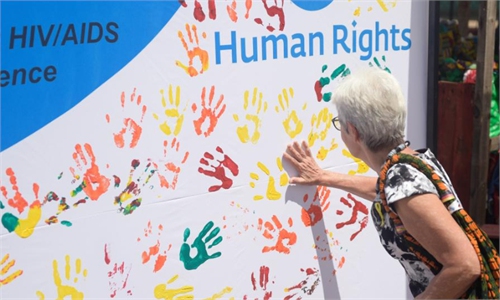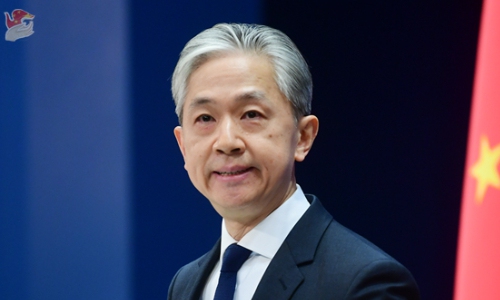China, EU reopen human rights dialogue after suspension since 2019
Effective exchange fends off politicalizing trend, double standard practices

A woman applies paint to a banner during a public event to commemorate the Human Rights Day in Gaborone, Botswana on Dec. 9, 2022. Human Rights Day is observed every year on Dec. 10 - the day the United Nations General Assembly adopted in 1948 the Universal Declaration of Human Rights. (Photo by Tshekiso Tebalo/Xinhua)
During the 38th session of the China-EU Human Rights Dialogue held in Brussels local time on Friday, which marked a resumption of the talks after a suspension since 2019, China urged the EU to view the development of China's human rights cause in an objective way, cease politicizing human rights issues with double standard practices, and respect China's sovereignty and core interests.
Chinese observers believe that such resumption, coming after bilateral ties became icy since March 2021, is of great necessity and will serve as an effective measure to rectify the malicious trend of politicizing human rights-related issues, the practices of double standards, and the use of human rights as a tool for rivalry.
According to an official press release of the event, the dialogue was co-chaired by Sun Lei, Deputy Director General for International Organizations and Conferences at China's Ministry of Foreign Affairs and Paola Pampaloni, Deputy Managing Director for Asia and the Pacific in the European External Action Service.
Sun stressed that matters related to China's Xinjiang and Xizang (Tibet) regions and affairs related to Hong Kong Special Administrative Region, should not be categorized as human rights issues, instead they are major issues of principle that are related to China's sovereignty, independence and territorial integrity, with no external interference allowed.
The EU is requested during dialogue to pay serious attention to China's concerns, and be cautious in words and deeds on issues involving China's core interests and major concerns, according to the Chinese Foreign Ministry.
China also shared its vision of human rights which is people-centered and views that the rights of survival and development are prioritized as basic human rights. The country pointed out that the EU should take note of its own human rights problems such as violations of the rights of refugees and immigrants, an increase in exclusiveness and racism, as well as the application of unilateral coercive measures that violate human rights in other countries and double standards in matters including freedom of the press and forced labor.
The two sides welcomed the in-depth and candid discussion despite their divergences. However, such differences should not be politicalized, and the two sides should continue dialogues to enhance understanding and handle differences with constructive measures. The two sides agreed to collaborate on safeguarding the rights of women and children, per the Chinese Foreign Ministry release.
"The reopening of the talks is of great necessity. Such talks would be effective in correcting the US-led Western malicious trend of politicizing human rights-related issues, the practices of double standards, and the use of human rights as a tool for competition," Chang Jian, a professor and director of the Center for the Study of Human Rights at Nankai University, told the Global Times on Sunday.
Tang Yingxia, vice director of the research center for human rights at Nankai University, told the Global Times that it also shows China's confidence and openness on human rights related issues.
Tang has just participated in the third review of China's implementation of the International Covenant on Economic, Social and Cultural Rights (ICESCR) in Geneva and she was part of China's high-level delegation representing NGOs where she had a faceoff with Western rights groups.
Those rights groups are trumpeting their values that promote human rights, democracy and freedom while neglecting other countries' progress made in the field and efforts made toward such progress, Tang said, adding that they use hearsay and false information to accuse and contain China.
The China-EU Human Rights Dialogue that started in 1997 and was held twice a year has been stalled since a session in April 2019, following EU's sanctions and China's countermeasures over human rights issues. The decision to resume the dialogue was taken at the China-EU Summit in April 2022.
Although the EU's foreign affairs spokesperson, Nabila Massrali, told media that the EU and China have different views on human rights, she said this is exactly why the dialogue is important. Some rights groups in Europe slammed the talks, labeling them "meaningless," as they advocate more sanctions against China and Chinese individuals rather than talks.
Chinese observers push back at such views, stressing that to yield positive fruits from these talks, it is crucial to be sincere and humble in the first place, so that both sides can learn from each other and enhance understanding of the reasons behind their divergences. China has displayed sincerity in the exchanges.
Wang Yi, member of the Political Bureau of the Communist Party of China Central Committee and director of the Office of the Central Foreign Affairs Commission, met with EU High Representative for Foreign Affairs and Security Policy Josep Borrell Fontelles on Saturday while attending the Munich Security Conference, stressing that China and the EU are not rivals but partners, and share more areas of agreement than points of divergence.
Chang warned the EU and US-led West that human rights issues should be a bridge rather than a barrier. If one side is trying to forcibly coerce its own understanding and practices onto others, human rights issues shall inevitably become a barrier for restoring ties.


